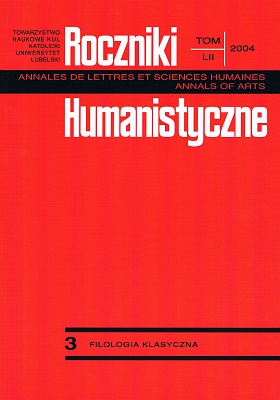Kilka przykładów metafizycznej przyczynowości konfliktów zbrojnych w Dziejach Herodota z Halikarnasu
Abstrakt
Human and divine spheres of activity continuously alternate each other within the pages of the Herodotean Histories – they take the shape of a constant struggle between the two “world ends”. This struggle materializes in the lot of particular characters like Croesus’ or Xerxes’ rise and fall, when the kings try in vain to stand up to supernatural powers, which have already prepared their own blueprint of the earthly history. Furthermore, it materializes in the figure of wise adviser, who becomes as if the embodiment of human attempts to free oneself from the dim dictatorship of the jealous deity. Finally, it is revealed in the very moment of making crucial decisions. Dreams and oracles, as they appeare, serve the role of specific devices in the hands of divine and also the most approachable way for human discovery of the fated future.
The consistent theology within Histories does not exist at all. Herodotus’ conviction (given expressis verbis or put in the mouth of his characters) about the existence of fate, ruling even the gods, about divine retribution – τίσις – or about the jealousy of the deities – φϑόνος, are ingrained into the religious thinking of Herodotus’ time. For he belonged, even by virtue of his pedigree, to the world of religious conservatism, comparable to that of Aeschylus, Sophocles, or other Greek thinkers of the Vth-century Hellade.
Bibliografia
Harrison T.: Divinity and History – the Religion of Herodotus, Oxford 2000.
Hart J.: Herodotus and Greek History, New York 1982.
How W.W., Wells J.: A Commentary on Herodotus, vol. I, Oxford 1912.
Jaeger W.: The Theology of the Early Greek Philosophers, Oxford 1947.
Immerwahr H.: Historical Action in Herodotus, „Transactions and Proceedings of the American Philological Association” 85 (1954), s. 16-45.
Immerwahr H.: Aspects of Historical Causation in Herodotus, „Transactions and Proceedings of the American Philological Association” 87 (1956), s. 241-271.
Marincola J.: Authority and Tradition in Ancient Historiography, Cambridge 1997.
Momigliano A.: Studies in Historiography, London 1966.
Pearson L.: Early Ionian Historians, Oxford 1939.
Pelling C.B.R.: Thucydides’ Archidamus and Herodotus’ Artabanus, [w:] Georgica: Greek Studies in Honour of George Cawkwell, ed. M.A. Flower and M. Toker, London 1991. BICS Supplement 58.
Romm J.: Herodotus, New Heaven–London 1998.
Sainte Croix G.E.M. de: Herodotus, „Greece and Rome” 24 (1977), s. 130-148.
Shapiro S.O.: Proverbial Wisdom in Herodotus, „Transactions and Proceedings of the American Philological Association” 130 (2000), s. 89-118.
Solmsen F.: Two Crucial Decisions in Herodotus, London 1974.
Thomas R.: Herodotus in Context, Cambridge 2000.
Waters K.H.: Herodotus and the Ionian Revolt, „Historia” 19 (1970), s. 504-508.
Waters K.H.: Herodotos the Historian – His Problems, Methods and Originality, London–Sydney 1985.
Wikarjak J.: Historia powszechna Herodota, Poznań 1961.
Veyne P.: Did the Greeks Believe in their Myths? An Essay on the Constitutive Imagination, transl. by P. Wissing, Chicago 1988.
Copyright (c) 2004 Roczniki Humanistyczne

Utwór dostępny jest na licencji Creative Commons Uznanie autorstwa – Użycie niekomercyjne – Bez utworów zależnych 4.0 Międzynarodowe.





